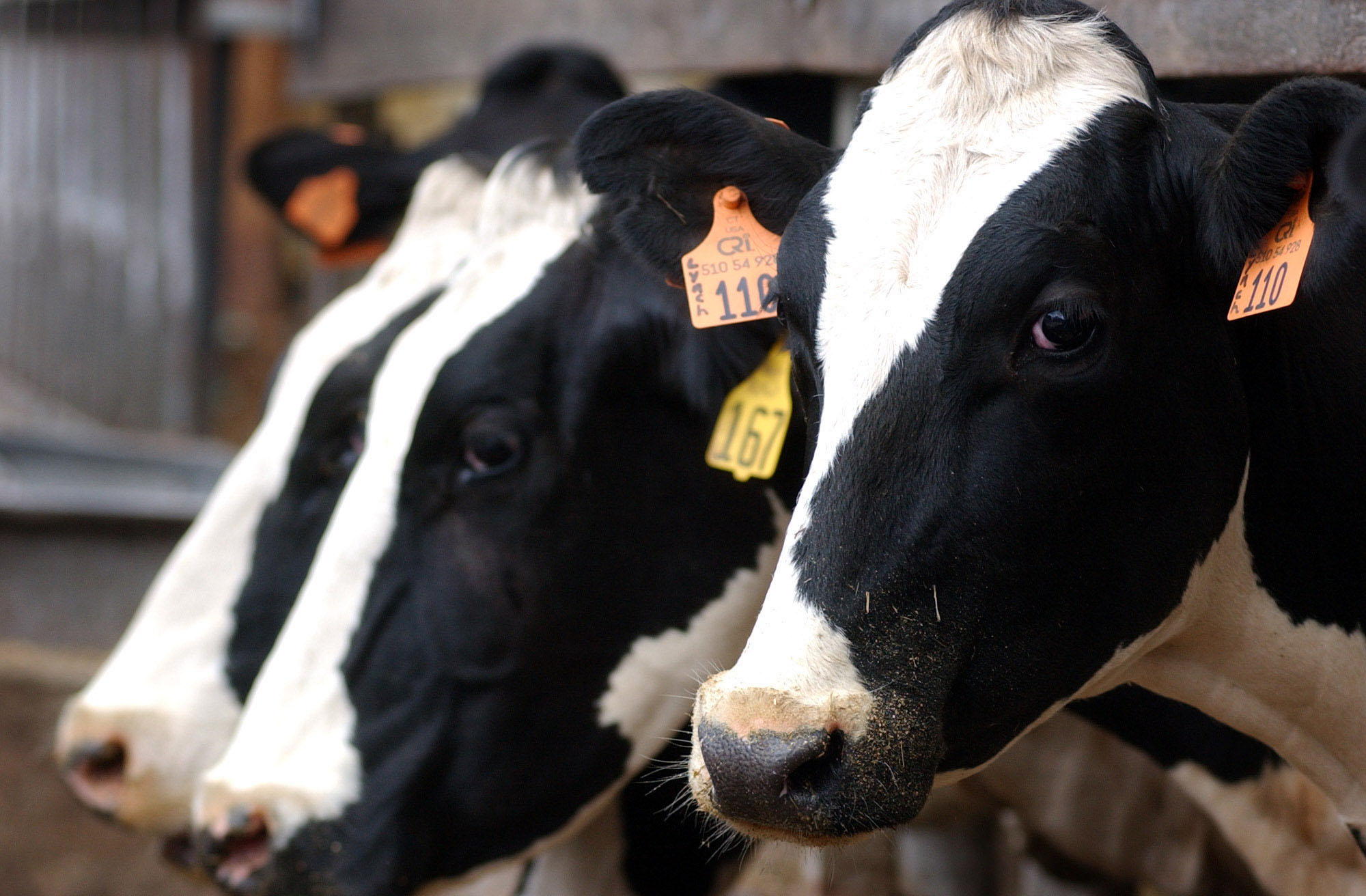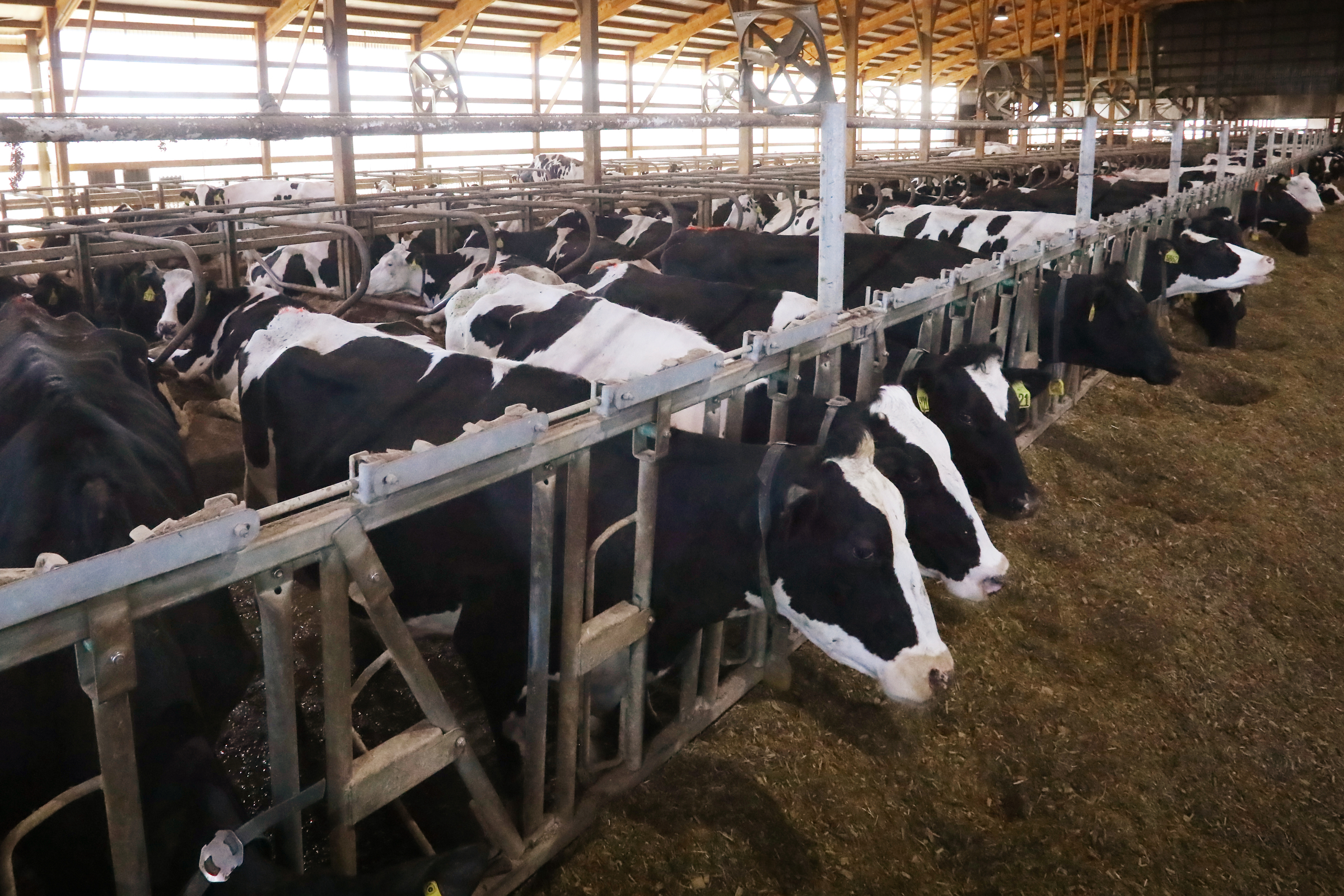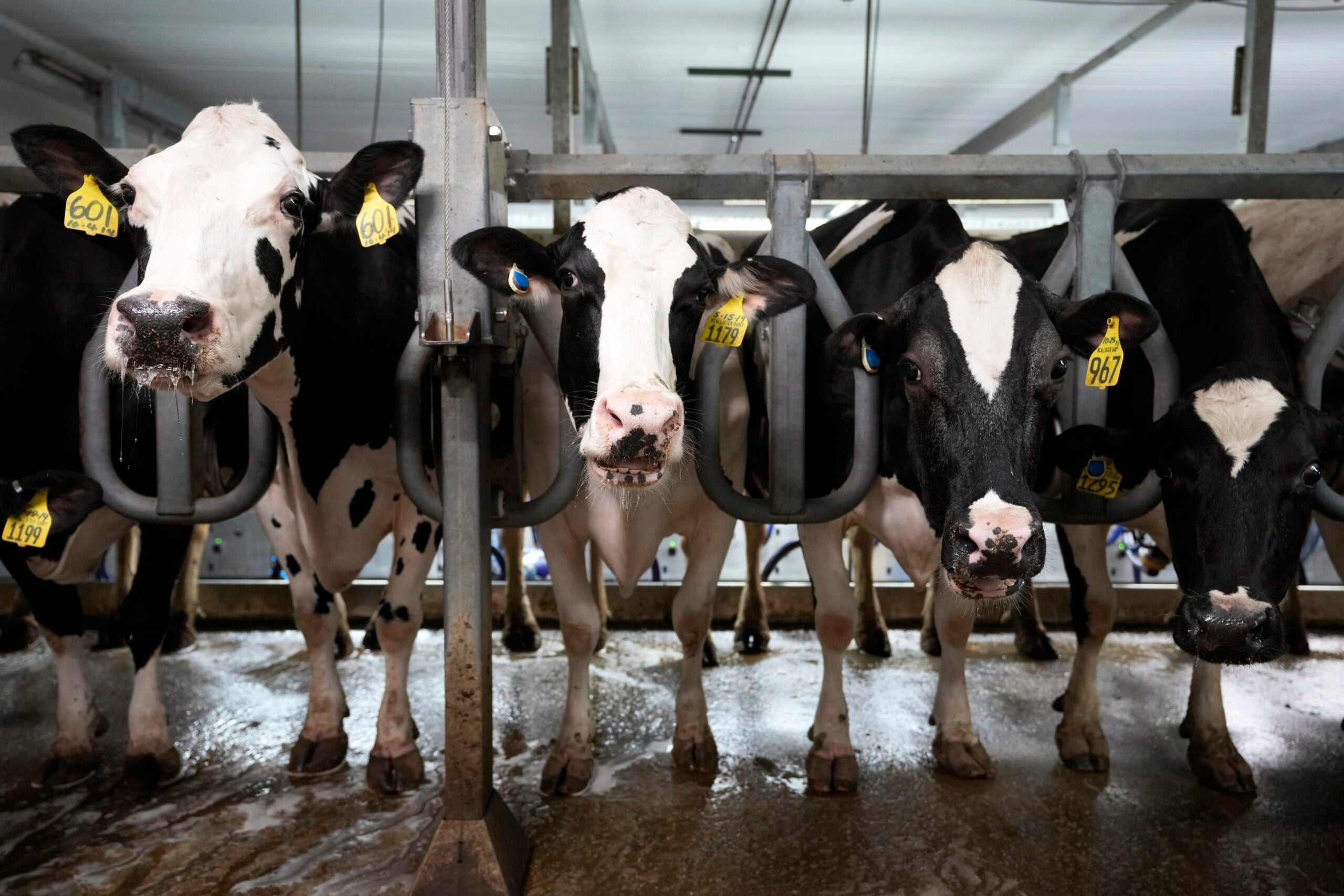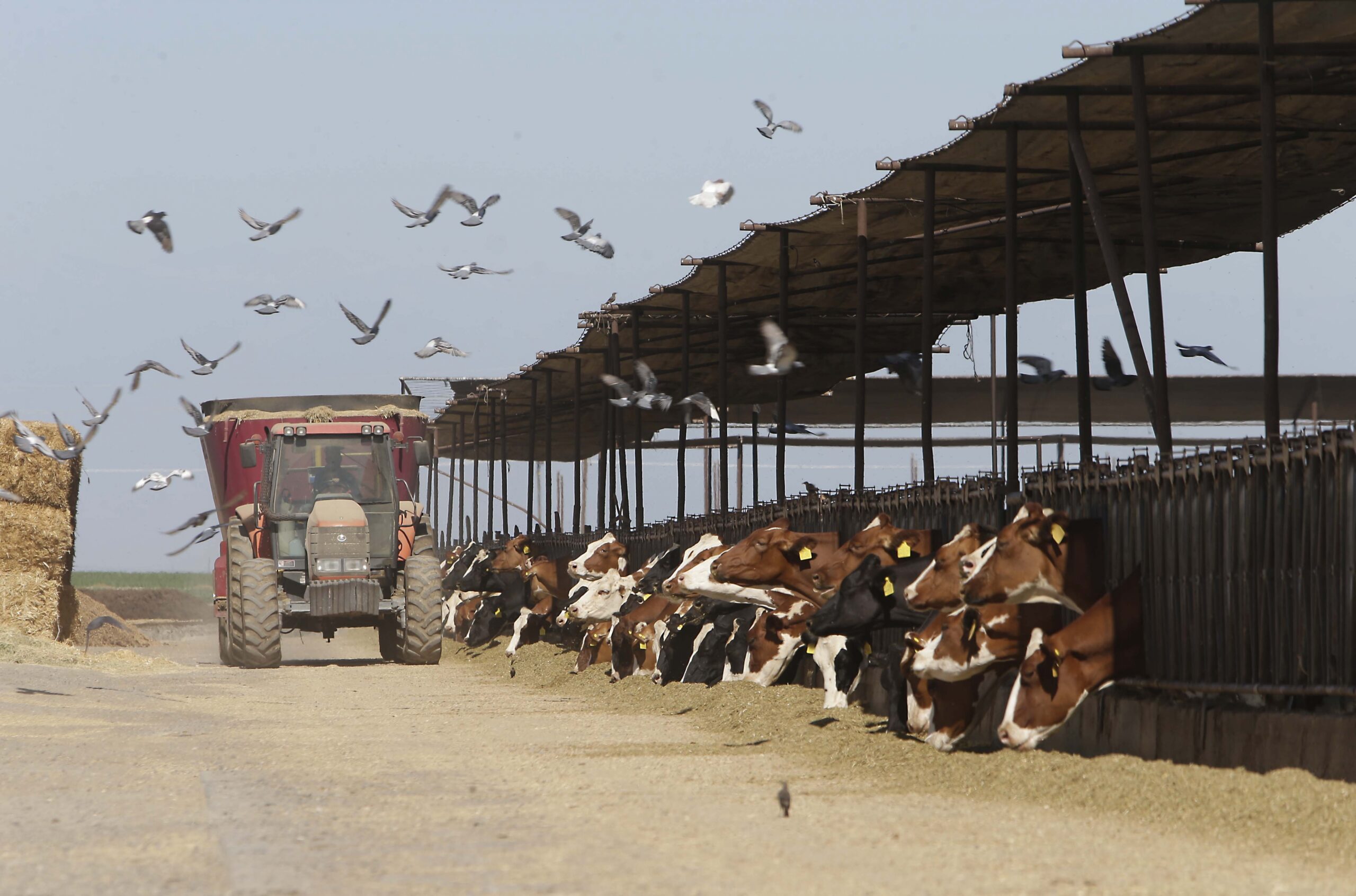A controversial dairy farm in Kewaunee County is suing state environmental regulators over changes to its wastewater permit that strengthen groundwater monitoring and prevent the operation from expanding beyond its current size.
The Wisconsin Department of Natural Resources issued the modified permit March 25 to Kinnard Farms in Casco. The changes are tied to a Wisconsin Supreme Court decision last year that found regulators can require operating conditions on so-called factory farms known as concentrated animal feeding operations or CAFOs.
The DNR had initially included a proposal by Kinnard Farms that set a maximum limit of 21,450 animal units, or roughly the equivalent of 15,000 cows, as part of changes to its wastewater permit. Under the revised permit, the farm can’t have beyond 11,369 animal units or its current size of roughly 8,000 cows.
News with a little more humanity
WPR’s “Wisconsin Today” newsletter keeps you connected to the state you love without feeling overwhelmed. No paywall. No agenda. No corporate filter.
In the complaint filed Friday in Kewaunee County Circuit Court, the farm said the agency’s decision to issue the permit was unlawful and should be reversed, changed or sent back for further review. Kinnard Farms said that limit was “unreasonably low” and affects the operation’s ability to remain competitive.
“If Kinnard is restricted from increasing its herd size, Kinnard may lose revenue associated with the sale of milk from additional dairy cows,” the complaint states. “Moreover, because fluctuations in herd size are a normal and expected consequence of dairy farming, the animal unit maximum will limit Kinnard’s operational flexibility and cause it to incur higher costs.”
The permit issued by the DNR requires the farm to monitor two fields where manure is spread that are south and west of the farm with three wells on each field. The permit also requires hourly water level and temperature monitoring for at least one well.
In its complaint, Kinnard Farms said the changes threaten to cost the farm “tens of thousands of dollars” to design, install and maintain a groundwater monitoring system on those fields without adequate justification. Kinnard Farms contends that groundwater monitoring at the two sites won’t produce reliable data to ensure the farm is complying with its permit and groundwater standards.
The farm has also petitioned the DNR for a contested case hearing. Tyler Dix, CAFO permit coordinator for the DNR, said in an email the DNR will review the petition and decide whether to grant or deny the request for a contested case hearing.
An attorney for the agency said it’s typical for parties to seek judicial review and a contested hearing at the same time to preserve their rights for a court to review the matter in the event the DNR denies a contested case hearing. If the DNR grants a hearing, it’s likely the court case would be put on hold until the contested case is finished.
Kinnard Farms argues it has enough storage and land to handle waste if the operation were to double in size.
“The Kinnard Farms family remains committed to regenerative agriculture and sustainability,” Kinnard Farms said in a statement. “On-farm practices such as planting cover crops, limited soil tillage (known as no-till), sand and water recycling and more demonstrate our dedication to protecting groundwater in our community. We continue to invest in cutting-edge innovation to protect our environment.”
Even without future expansion, a DNR fact sheet states groundwater monitoring data at Kinnard Farms has found “persistent exceedances of groundwater quality standards for nitrate and bacteria.” Sampling of monitoring wells in production areas have shown nitrate concentrations of more than 20 milligrams per liter — double the state’s health and groundwater standards of 10 milligrams per liter.
Nitrates are the state’s most widespread contaminant and have been associated with birth defects, thyroid disease and colon cancer. Research has shown around 10 percent of the state’s 800,000 private wells exceed federal health standards for nitrates. Around 90 percent of nitrogen in groundwater can be traced back to agriculture.
Residents in Kewaunee County have struggled with drinking water contamination of private wells from agriculture for years. The region is susceptible to pollution from manure runoff due to thin soils and fractured bedrock that allow contamination to seep into groundwater more easily.
Clean Wisconsin staff attorney Evan Feinauer disputed in a statement that the farm could double its size without harming drinking water.
“There is no doubt Kewaunee families are facing serious water contamination issues and have been for years,” Feinauer said. “This is about using science to understand what’s happening to our water resources and guide us to effective solutions that protect public health. Groundwater monitoring can help us identify potential problems that lead to contamination and also validate whether the important conservation efforts that are already underway are making an impact.”
Jodi Parins lives outside of Algoma about a quarter mile from the farm’s fields. She said installing groundwater monitoring wells is the only way to know whether agricultural practices are affecting groundwater quality.
“I believe the onus should be on the operator to prove that his practices are not contaminating people’s drinking wells,” Parins said.
Parins noted the farm previously said it had no plans to expand under the current term of the permit, which expires at the end of January. She added that the Wisconsin Supreme Court has already decided the DNR has authority to impose operating conditions on the farm.
In July, the Wisconsin Supreme Court ruled the DNR had authority to impose permit conditions on Kinnard Farms to protect water quality as part of a case that challenged a permit issued by the DNR. The decision stemmed from a 2012 request by the farm to add a second site and more than 3,000 dairy cows, almost doubling the size of its operation at the time. Nearby residents challenged the permit, setting off years of litigation.
The Wisconsin Supreme Court ruling upheld a 2014 decision by an administrative law judge that ordered the DNR to require a limit on animals for Kinnard Farms in addition to offsite groundwater monitoring, citing “a crisis with respect to groundwater quality in the area.”
Since then, the DNR reissued the farm’s water quality permit in 2018, which was also challenged by residents. The agency reached a settlement with the farm that required changes to the permit if the state Supreme Court affirmed the DNR’s authority to require a cap and offsite monitoring.
Editor’s note: This story has been updated to clarify the legal review process for the farm’s case.
Wisconsin Public Radio, © Copyright 2025, Board of Regents of the University of Wisconsin System and Wisconsin Educational Communications Board.






